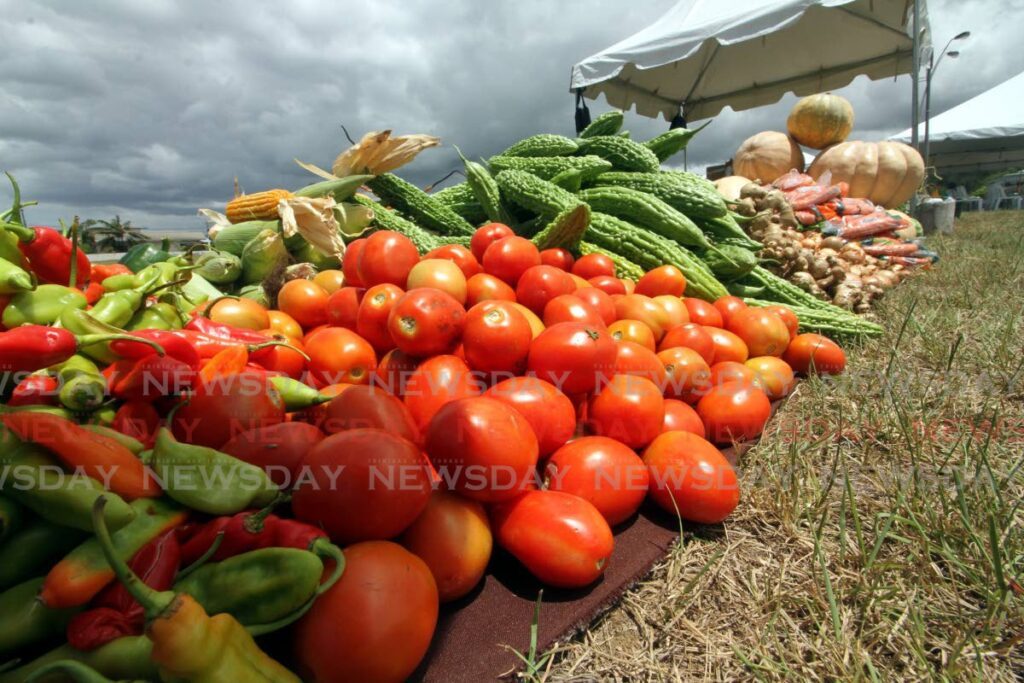Finding the balance between healthy and affordable meals

The Health Minister’s claim that the public is addicted to fast food has once again sparked controversy about healthy food options as well as the link between non-communicable diseases and a person's diet.
Speaking at the opening ceremony of the U Caribbean Health Digest health and wellness expo held at the Hyatt Regency in Port of Spain on February 26, Health Minister Terrence Deyalsingh said people are addicted to fats and sugar in the same way that people are addicted to hard drugs such as cocaine.
He also called for people to live healthier lifestyles, reduce their high sugar and fat intake and exercise.
“We are asking you to do three simple things: substitute Coca-Cola and Pepsi, Solo and Chubby, for water. I am not saying to cut it out, I am saying do it in moderation. Do not give your children a diet of KFC and pizza on a daily basis. Give them some fruits and vegetables, and that thing that you call stairs, use it.”
This was echoed by the ministry’s director of NCDs Dr Maria Clapperton, in an interview with Sunday Newsday on February 28.
“Through the TTMoves programme we are focusing on movement for lifestyle change and NCD, we encourage people to increase their intake of fruit and vegetables, increase their daily intake of water, increase their physical activity levels, and know their numbers.

“There are modifiable and non-modifiable risk factors for NCDs. Ones like genetics and hormones you can’t do anything about, but things like a proper diet and living a healthy lifestyle are within our remit, along with other unhealthy behaviours like smoking and alcohol consumption. We are empowering and educating people to take ownership of their health.”
Asked how people could live a less sedentary lifestyle when they spent several hours in traffic daily, Clapperton reiterated that people should take ownership of their health and find ways to move during the day.
The Diabetes Association of TT (DATT), in a release on February 27 in response to Deyalsingh’s remarks, said it had conducted a survey on junk food consumption with 954 people aged between 11-35 years.
“The findings reveal a significant inclination towards fast food consumption among the youth, with a staggering 88.4 per cent admitting to eating fast food at least once a week. Alarmingly, more than one-third of these respondents reported consuming fast food more than three times per week.
“Despite universally accepted recommendations suggesting the consumption of four to five servings of fruits and vegetables daily, the survey results were far from meeting these guidelines. Only 23 per cent of respondents met the target for vegetable intake, and a mere 13 per cent did for fruit. Furthermore, about half of the participants failed to include a fruit or vegetable in their diet on more than one day of a typical week, highlighting a significant gap in nutritional adherence.”
The association said fast food preferences were dominated by well-known chains, with the popularity rankings as follows: KFC (88 per cent), doubles (78 per cent), Chinese (72 per cent), Subway (68 per cent), Churches (65 per cent), Royal Castle (63 cent), Pizza Hut (61 per cent), barbecue (59 per cent), and gyros/burgers (54 per cent).

Sunday Newsday took an informal poll on how much people spend on food on a daily basis and what meals they buy. Most people who responded said they spend up to $100 on food daily.
The average price of a meal at a Creole restaurant starts at $25, while Chinese food can cost from $20 up. Fast food franchises such as KFC and Royal Castle cost $23 and up for a single piece of chicken and fries, with sides costing $12 and up. The cheapest meal of all doubles costs at least $10-$12 as most people buy a minimum of two.
Nuts and seeds beneficial
Dietician Lisa Feveck said the best option for people who wanted to eat healthy was to stick to whole plant foods.
“That’s your whole grains, provisions, peas, beans, nuts, seeds, fruit and vegetables. Seeds are particularly beneficial since they have an array of vitamins and minerals, some have omega 3s etc for minimal cost, compared to other foods.
“Of course portion sizes would be determined by your height, weight, medical condition etc.”

She noted that some preserving methods were better than others, if food could not be purchased fresh, and distinguished between whole plant foods and ultra-processed foods.
“Frozen plant foods are high quality, for eg, frozen peas, fruits and vegetables. Canned foods are of lesser quality health-wise, because of additives like sodium but in a country that experiences flooding, earthquakes etc they are useful to have, and most if drained and rinsed are good options.”
Feveck said while protein is needed, it does not have to be from animals.
“Red meat raises the risk for chronic disease. This doesn't mean it's automatic, but that the likelihood of you developing disease is raised significantly if you’re constantly eating meat especially if it’s cooked in unhealthy ways eg frying. So if people choose to eat meat, then chicken breast and fish are better choices.
“If people make 80 per cent of their meals from plant foods, then even if they choose to eat meat, fried foods, pastries, etc, what I call the 'bad' stuff, their risk is a lot lower for everything compared to someone who focuses on animal foods to make up most of their meals.”
Effects of poor diet on health
The study on the impact of diet on cardiovascular disease (CVD) and diabetes mortality in Latin America and the Caribbean: a comparative risk assessment analysis, published in the journal Public Health Nutrition in 2021, said in 2010, there were approximately 513,371 cardiometabolic (CMD) deaths in Latin America and the Caribbean.

According to the US National Centre for Biotechnology Information, deaths due to cardiometabolic diseases include endocrine, nutritional, and metabolic (ENM) diseases (eg thyroid conditions, diabetes, hyperlipidemia, obesity); hypertensive heart disease (eg heart disease caused by prolonged exposure to high blood pressure); and ischemic heart disease and other diseases of the circulatory system (eg reduced blood supply to the heart, including atherosclerosis and coronary heart disease (CHD), stroke, and other cardiovascular conditions).
It said that the largest diet-related CMD burdens were related to low intake of nuts/seeds (109,831 deaths or 11.5 per cent), low fruit intake (106,285 deaths or 11.1 per cent) and high processed meat consumption (89,381 deaths or 9.4 per cent).
Among countries, the highest CMD burdens (deaths per million adults) attributable to diet were in TT (1,779) and Guyana (1,700) and the lowest were in Peru (492) and The Bahamas (504).
The study said between 1990 and 2010, the greatest decline (35 per cent) in diet-attributable CMD mortality was related to greater consumption of fruit, while the greatest increase (7.2 per cent) was related to increased intakes of sugar-sweetened beverages.
Warning labels on food
In June 2023, Deyalsingh, speaking at a meeting with restauranters and the TT Chamber of Industry and Commerce, said “The incidence of diabetes and obesity among our children is alarming and therefore there is a need to revisit the food options fed to them to avoid an explosion of non-communicable diseases (NCDs).
Present at the meeting was TT Chamber CEO Stephen de Gannes, with heads from Restaurant Holdings Limited, Global Brands, Mario’s Pizzeria Ltd, Prestige Holdings Ltd, Jenny’s on the Boulevard, Pappy’s Fried Chicken, Chuck E. Cheese, Arazzi and Salt n’ Pepper Classical Indian Cuisine. There was agreement by the restaurants to devise strategies to include healthier options on their menus and to reduce salt and sugar content.
The Diabetes Association said it was committed to supporting the government in implementing regulations, policies, and legislation aimed at reducing the consumption of ultra-processed foods in TT.
It suggested implementing three measures: black octagonal front-of-package warning labels to inform consumers about products high in sugars, fats, and sodium etc; regulations to ban targeted advertising of ultra-processed foods to children, including prohibiting advertisements, sponsorships, and promotions of unhealthy foods in schools, media, and events; and taxation of sugar-sweetened beverages to discourage the consumption of unhealthy foods and beverages.
However, on February 28, in response to a question from Newsday, Deyalsingh said there are no plans to regulate the industry or impose taxes to discourage consumption.
"The focus of the ministry is on public education in making healthy choices for their families, most importantly, children who will bear the brunt of this NCD epidemic in years to come.”
Obesity among children
The draft National Research Agenda launched on Friday said NCDs were estimated to account for 81 per cent of the 12,100 deaths in 2016, with communicable, maternal, perinatal, and nutritional conditions and injuries accounting for the remaining 19 per cent.
The Health Ministry’s National Strategic Plan for the Prevention and Control of Non-Communicable Diseases: TT 2017-2021 said two studies conducted between 2008-2011 showed that 26-30 per cent of participants were hypertensive. The ministry estimates that 14.5 per cent of the population has diabetes and 88-90 per cent of patients have Type 2 diabetes. It said cardiovascular disease accounts for approximately one-third (32.6 per cent) of all NCD-related deaths.
In a release in July 2023, the TT Paediatric Society said there had been an increase in childhood obesity over the past 20 years, with a recent study by the World Health Organisation saying TT ranked eighth worldwide with an obesity rate of 14 per cent in those less than five years old.
“We note that this increase in the number of overweight children has correlated with reduced physical activity, increased screen time and unhealthy and unbalanced diets. Families spend less time at home with increased hours in traffic, parents working longer hours and children spending more hours in lessons.
“Many schools have also removed physical education from their timetables as children approach examination classes to devote more hours to academic achievement. Parents are often left with few options in terms of quick affordable fast food to sustain their families. Unfortunately, these are the foods that are high in calories, fat, salt and sugar, all ingredients of an unhealthy, unbalanced diet.”


Comments
"Finding the balance between healthy and affordable meals"